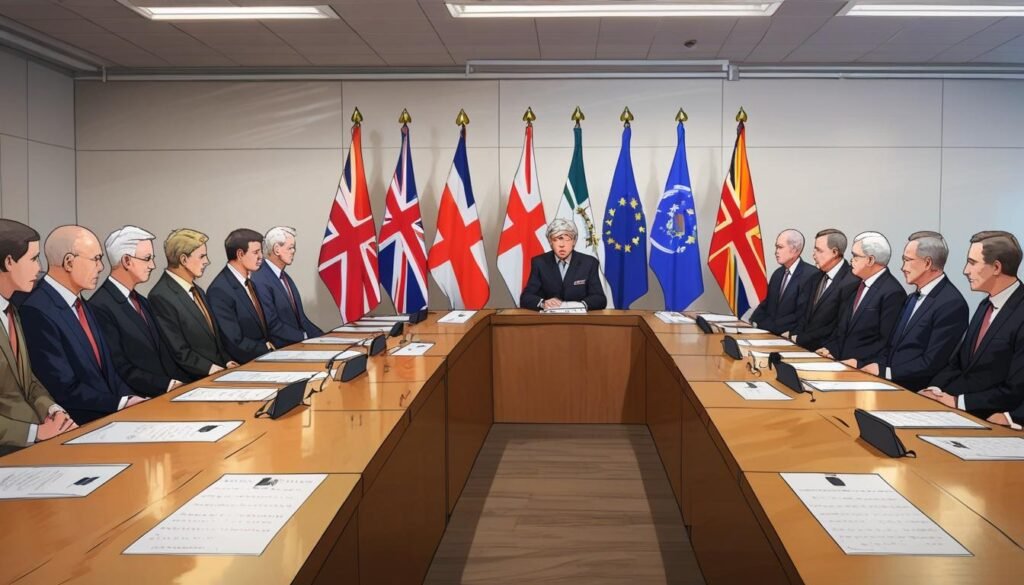**London**: The UK and EU are set to finalise a defence and security pact next month, aimed at bolstering Europe’s military capabilities. This comes amid increased defence expenditure and cooperation following shifts in US foreign policy, particularly regarding NATO and support for Ukraine.
The recent geopolitical landscape has been significantly influenced by the actions of the Trump administration, leading the European Union to intensify its efforts to establish a defence and security pact with the United Kingdom. This anticipated agreement aims to facilitate the participation of British arms companies in a collective arms procurement process, designed to enhance Europe’s defence capabilities amid increasing tensions with Russia and ongoing concerns surrounding NATO.
European countries have been prompted to reassess their military strategies in response to President Donald Trump’s implied threats to withdraw support from NATO allies. The shift in the US foreign policy has resulted in European nations scaling up their defence expenditures, particularly in terms of their commitments to aid Ukraine in light of potential peace negotiations brokered by the United States.
Next month, a summit, hosted by British Prime Minister Sir Keir Starmer, is set to take place where the defence and security pact is expected to be signed. This event marks the first gathering of EU leaders under such an arrangement since the UK’s exit from the EU. An EU diplomat remarked, “On defence, the Brits are basically back inside the tent. We just need this agreement to affirm that.”
Preparations for this summit were underway as EU ambassadors convened last Friday, with several diplomats indicating that a majority of member states expressed support for finalising the defence and security pact alongside a broader statement addressing geopolitical issues.
A significant factor in this accord is the stipulation from the European Commission, which requires a formal agreement for the UK’s participation in a proposed €150 billion loan programme. This programme is aimed at enabling nations to jointly procure critical military equipment, including air and missile defence systems.
Further collaboration has been exemplified through recent meetings involving UK officials. Britain’s Defence Secretary John Healey co-hosted discussions in Brussels with his French counterpart, and together, they attended a meeting in Germany focusing on military supplies for Ukraine. Concurrently, UK Chancellor Rachel Reeves engaged with EU finance ministers in Warsaw, advocating for greater defence financing collaboration within Europe.
In addition to the defence pact, EU capitals are pursuing two further agreements with the UK that will address energy, migration, and fisheries—issues that are particularly contentious for countries like France and Denmark. As the current fishing access agreement is set to expire in 2026, there are concerns among coastal EU nations regarding future access to UK waters. A French diplomat indicated that any British attempts to renegotiate fishing rights could complicate broader negotiations, including those related to defence.
Despite the sensitivity surrounding fishing access, EU diplomats have emphasised the need for a pragmatic approach, pointing out that it would be counterproductive for minor economic issues to hinder progress on essential security cooperation. A French diplomat stated, “The war, Trump, and re-arming Europe is bringing France and the UK closer. But we need goodwill on some other things to bring the EU and UK closer.”
Both French and Danish officials have expressed a willingness to explore deeper cooperative ties with the UK. Danish Economy Minister Stephanie Lose commented on Denmark’s openness to collaboration, remarking, “We know that we have close bonds with Norway, with the UK, so of course we should be open to explore… other things that could actually help strengthen Europe.”
Support for closer ties to the UK has also been echoed by key figures in the EU, including Commission President Ursula von der Leyen and Council President António Costa. EU Economy Commissioner Valdis Dombrovskis stated, “To strengthen Europe’s defence we must do many things in the EU but we must also do many things outside of the EU, so we are open to that engagement.”
With the EU summit approaching, the focus on enhancing defence cooperation with the UK is indicative of a shifting security landscape in Europe, shaped by both internal and external pressures.
Source: Noah Wire Services





